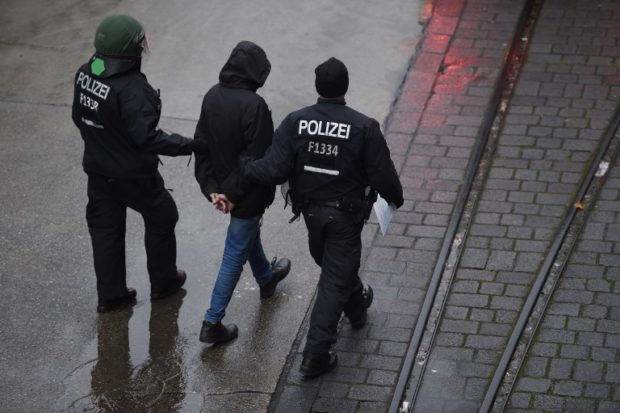Young male migrants fuel rise in violence in Germany — study

Policemen march off a refugee at the former airport Tempelhof in Berlin on Nov. 29, 2015, after a brawl erupted among refugees. The recent influx of mostly young, male migrants into Germany has led to an increase in violent crime in the country, according to a government-funded study published Wednesday, Jan. 3, 2018. AFP FILE
BERLIN, Germany — The recent influx of mostly young, male migrants into Germany has led to an increase in violent crime in the country, according to a government-funded study published Wednesday.
The study used figures from the northern state of Lower Saxony to examine the impact of refugee arrivals on crime in 2015 and 2016, a period when the number of violent crimes reported increased by 10.4 percent.
The authors concluded that 92 percent of the additional crimes recorded could be attributed to the increase in refugee numbers.
It noted that the demographic composition of the refugee population is a major factor. Young males — whether Germans or migrants — are generally more likely to commit crimes, but also more likely to become victims of violence.
The findings add to the ongoing debate in Germany about how to tackle migrant crime, which has been fanned by a number of high-profile incidents. Parties on the right, including German Chancellor Angela Merkel’s Union bloc, want a tough response and more deportations, while those on the left say more needs to be done to integrate refugees into German society.
Article continues after this advertisement“It is true that since 2015 there has been a rise in violent crime that the authors attribute to the arrival of refugees,” said Verena Herb, a spokeswoman for the Families Ministry that commissioned the study. “But they also make very clear that refugees aren’t generally more criminal than for example Germans.”
Article continues after this advertisementHerb told reporters in Berlin that the biggest problems seemed to come from young men who see little hope for their futures. Afghans and Syrians were less likely to commit crimes than migrants from North Africa, who stand little chance of receiving permission to stay in Germany, the study found.
“In our view, this shows once more that those who come here mustn’t be left to their own devices,” she said. “Only that way can we ensure that boredom and frustration don’t result in criminal behavior.”
The study, led by prominent criminologist Christian Pfeiffer and published by the Zurich University of Applied Sciences, says most of the refugees came to Germany from Muslim countries that are “characterized by male dominance” and an acceptance of a “macho culture” that can justify violence.
The lack of women among Germany’s refugee population is also seen as an aggravating factor.
“This makes it more likely for groups of young men to emerge among the refugees and they can develop a violent dynamic of their own,” the authors wrote, concluding that it makes sense to allow refugees to bring over their families.
The report also notes that people are twice as likely to report crimes if they are committed by people who are different from them, causing some distortion in the crime statistics. /cbb